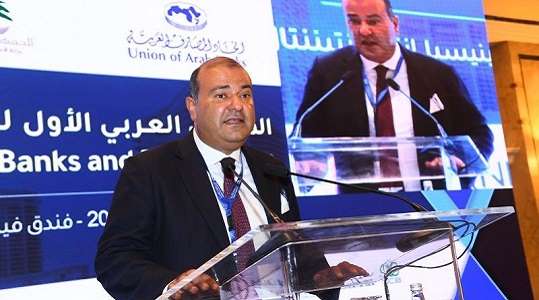The Secretary-General of the Union of Arab Chambers, Dr. Khaled Hanafi, during his participation in the First Arab Forum for Banks and Businessmen, which was held in Beirut during the period 3 and 4 August 2023, in the presence of the Minister of Economy and Trade in Lebanon Amin Salam, President of the Union of Arab Banks and President of Banque du Caire Mohamed El Etreby, Secretary-General of the Union of Arab Banks Wissam Fattouh, former Prime Minister of Lebanon Fouad Siniora, and Lebanese and Arab official and economic figures, stressed the “importance of enhancing confidence as a basic gateway to attract investments, whether from the side of the national and Arab investor or the investor from foreign countries”.
Hanafi pointed to "The importance of the issue of financial inclusion, which is very necessary in order to strengthen the capabilities of Arab banks and thus increase the size of the capital of Arab banks, which currently ranges between 3 and 4 trillion dollars. Which at the same time contributes to strengthening the reality of the formal sectors and reducing the impact of the reality of the informal or informal economy on the reality of Arab economies."
He stressed, "Small and medium enterprises must be supported as they constitute an important and large part of the volume of activity of Arab institutions and companies," pointing out that "Egypt, for example, but not limited to these institutions, has recently been pumped $ 200 million in order to support these institutions, which would enhance the reality of the Egyptian economy. Note that all Arab banks have liquidity estimated at $ 400 billion, and therefore banks can support small and medium enterprises, which is very important to enhance the capabilities of entrepreneurs and enhance the reality of innovation in the Arab world."
The Secretary-General considered that it is necessary to cooperate between the business sector represented by the Arab Chambers in partnership and cooperation with Arab banks and other Arab financial institutions in order to create a sustainable and productive economy, providing decent job opportunities, investing in infrastructure, and in innovations that generate green growth and opportunities for all groups and segments of society. This will contribute to bridging the financing gap in the Arab world to achieve the 2030 Sustainable Development Goals.
He stressed that achieving the SDGs would improve the private business environment and promote market building. He believed that redirecting public and private investments would create huge opportunities for companies to expand and develop their activities and innovations in this context, as UNDP sources indicate that the financing gap in the Arab world to achieve the 2030 Sustainable Development Goals is about $ 85 billion annually. This requires mobilizing societal capacities and capabilities to contribute to achieving the desired goals.
The Secretary-General called for the need to find legislation and laws to regulate the reality of digital currencies, not encrypted, which will have a great positive impact on enhancing the reality of trade exchange and cooperation with the rest of the world away from linking this cooperation to a specific currency that would limit the strengthening of our strategic relations with the countries of the world. He considered that the liberalization of the currency exchange rate is an essential element to enhance confidence, with the importance of taking into account the concerns arising from the subject of liberalization, but for the success of our Arab economies, a policy of liberalization must be pursued. Otherwise, we will continue to revolve in the same vortex and maze and our Arab economies will remain governed by speculators.
He pointed out that financial inclusion is very important in terms of paying attention to low-income people, promising groups of youth and women, in addition to focusing on the access of small, medium, and micro enterprises to financial services and integrating them into the financial and banking sectors by providing appropriate financial products and services. This should be a top priority in the Arab world, which has one of the lowest in the world's percentage of those who own bank accounts.
Hanafi expressed his optimism about what will be achieved by the organic and close cooperation between Arab banks and Arab chambers, and I am confident that success in implementing sustainable development plans is largely linked to achieving communication between the power of money and the capabilities of the private sector with broad sectors of Arab societies in order to achieve the desired advancement and progress for present and future generations.
Source (Union of Arab Chambers)

